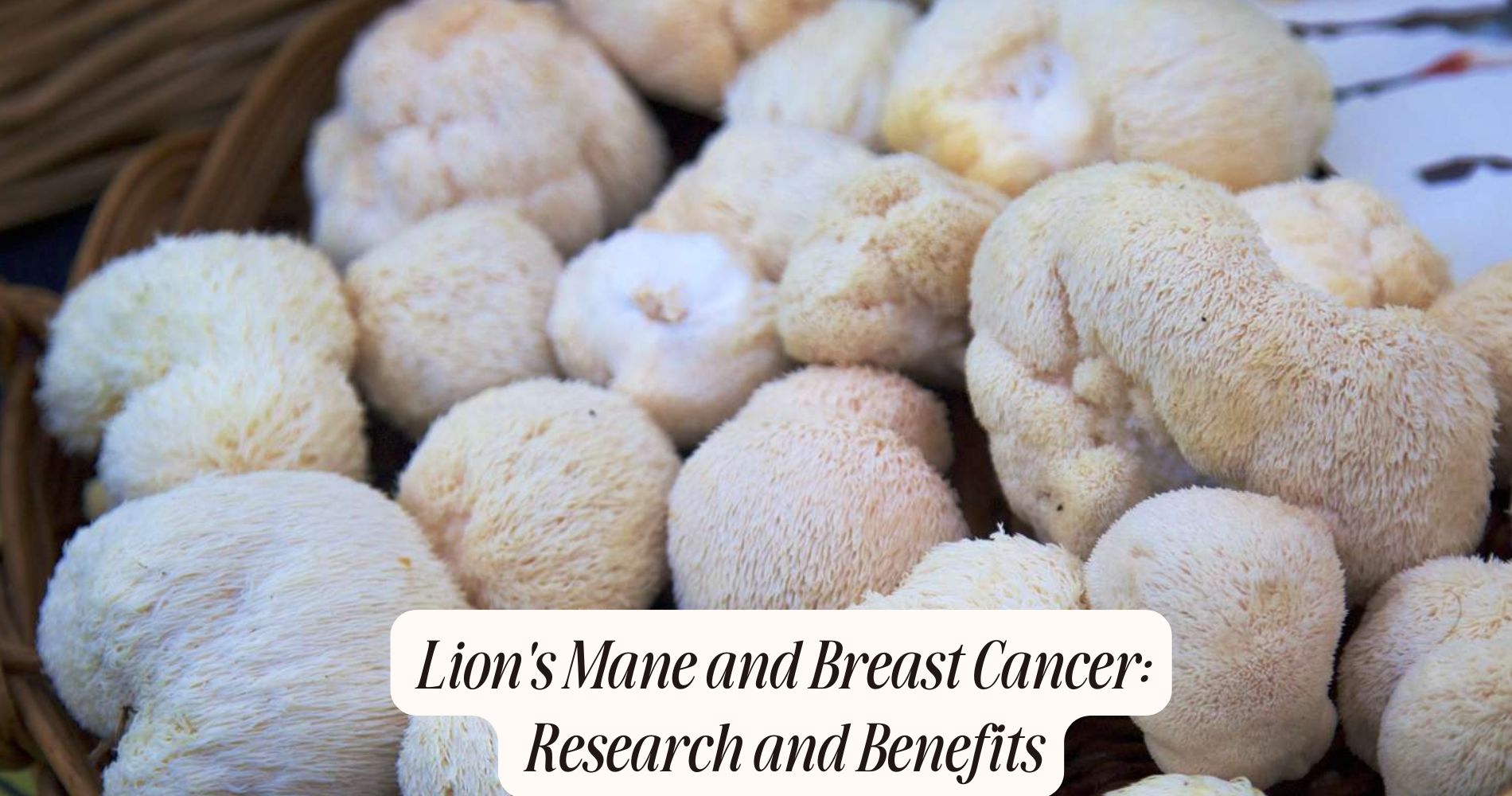
Lion's Mane and Breast Cancer: Research and Benefits
Lion's Mane, or Hericium erinaceus, shows potential in combating breast cancer due to its bioactive compounds like polysaccharides and antioxidants. These compounds have been shown to inhibit cancer cell growth, enhance apoptosis, and reduce metastasis. Polysaccharides in Lion's Mane enhance immune responses and directly counteract malignant cells. Antioxidants like hericenones and erinacines reduce oxidative stress and support cellular repair. Integrating Lion's Mane with conventional treatments like chemotherapy can improve efficacy and manage side effects. Research indicates that consistent consumption may lower tumor development risk and support overall treatment outcomes, revealing much more potential if you explore further.
Understanding Lion's Mane
Lion's Mane, known scientifically as Hericium erinaceus, is a medicinal mushroom renowned for its neuroprotective and anti-inflammatory properties. When you explore the world of medicinal mushrooms, Lion's Mane stands out due to its potential health benefits supported by scientific studies. It's not just folklore; modern research confirms its efficacy.
Understanding Lion's Mane involves recognizing its unique morphology and growing conditions. It's characterized by its long spines and a resemblance to a lion's mane. This mushroom thrives on hardwoods and is mainly found in North America, Europe, and Asia. Cultivating Lion's Mane requires a controlled environment with specific humidity and temperature settings to promote ideal growth.

From a medicinal perspective, Lion's Mane is distinguished by its ability to enhance cognitive functions. Studies have demonstrated that consuming Lion's Mane can improve memory and focus, likely due to its neuroprotective effects.
This mushroom also exhibits anti-inflammatory properties, which can help mitigate chronic inflammation—a key factor in many diseases.
Bioactive Compounds
You should focus on the bioactive compounds in Lion's Mane, especially polysaccharides, known for their antitumor activity.
These compounds can inhibit the proliferation of breast cancer cells.
Additionally, antioxidants present in Lion's Mane enhance cellular health by reducing oxidative stress.
Polysaccharides and Antitumor Activity
Recent studies have identified polysaccharides from Lion's Mane mushroom as potent bioactive compounds with significant antitumor activity against breast cancer cells. The polysaccharide structure plays a vital role in this activity. These complex carbohydrates consist of various monosaccharide units, including glucose, mannose, and galactose, linked in specific configurations. This unique structure facilitates the immune modulation capabilities of Lion's Mane polysaccharides, enhancing the body's natural defense mechanisms against cancer cells.
By modulating the immune response, these polysaccharides activate macrophages and natural killer (NK) cells, key players in the body's antitumor response. They stimulate cytokine production, which promotes the destruction of cancerous cells. Additionally, these bioactive compounds can inhibit the proliferation of breast cancer cells by inducing apoptosis, or programmed cell death, thereby reducing tumor growth.
You might find it interesting that the antitumor effects of Lion's Mane polysaccharides aren't limited to direct cytotoxicity. They also enhance the efficacy of conventional chemotherapy drugs, making them a promising adjunct in cancer treatment. This dual action—direct inhibition of cancer cells and immune system enhancement—highlights the therapeutic potential of Lion's Mane polysaccharides in breast cancer management.
Antioxidants and Cellular Health
Frequently, antioxidants found in Lion's Mane mushrooms play an essential role in maintaining cellular health by neutralizing harmful free radicals and reducing oxidative stress. These bioactive compounds, including hericenones and erinacines, are known to scavenge free radicals, thereby mitigating the damage they cause to cellular structures such as DNA, proteins, and lipids. By reducing oxidative stress, these antioxidants support cellular repair mechanisms, enhancing the body's ability to maintain healthy cells and tissues.
You'll find that oxidative stress is a significant factor in the progression of many chronic diseases, including cancer. When your cells are under constant oxidative assault, their repair mechanisms can become overwhelmed, leading to mutations and malignant transformations. The antioxidants in Lion's Mane help to counteract this by bolstering the cellular repair processes, ensuring that cells can recover from oxidative damage more efficiently.

Research has demonstrated that these antioxidants not only protect cells but also stimulate the production of protective enzymes and repair proteins. This dual action makes Lion's Mane a promising adjunct in therapies aimed at reducing oxidative stress and promoting cellular health, particularly in the context of breast cancer prevention and treatment.
Anti-Cancer Properties
Lion's Mane mushroom has demonstrated significant anti-cancer properties, particularly in inhibiting the growth of breast cancer cells. Numerous studies have shown that compounds derived from Lion's Mane can effectively reduce the proliferation of these malignant cells. Integrating this mushroom into your diet could play a role in your overall dietary impact on cancer prevention, complementing other lifestyle factors like regular exercise and stress management.
Research has identified specific bioactive components in Lion's Mane, such as hericenones and erinacines, that exhibit potent anti-cancer activities. These compounds have been shown to induce apoptosis, or programmed cell death, in breast cancer cells. Additionally, they can inhibit cell migration and invasion, key processes in cancer metastasis.
The anti-inflammatory properties of this mushroom further contribute to its cancer-fighting capabilities by reducing the chronic inflammation often associated with cancer progression.
Consuming Lion's Mane as part of a balanced diet may offer a non-toxic, adjunctive therapy to conventional treatments. It's crucial to consult with healthcare providers to tailor dietary choices to individual health needs, but the evidence suggests that integrating Lion's Mane could be a beneficial strategy in mitigating breast cancer risk.
Mechanisms in Breast Cancer
You need to understand how breast cancer progresses at the cellular level to appreciate the potential impact of Lion's Mane.
Cellular growth inhibition, apoptosis induction pathways, and metastasis suppression mechanisms are critical areas of focus.
Let's explore how these mechanisms contribute to the development and spread of breast cancer.
Cellular Growth Inhibition
Recent studies indicate that certain compounds in Lion's Mane mushrooms can inhibit cellular growth pathways involved in breast cancer. These compounds, such as hericenones and erinacines, interfere with cellular signaling processes that are essential for tumor proliferation. By disrupting these pathways, they can potentially alter the tumor microenvironment, making it less conducive to cancer cell growth.
You should know that the inhibition of cellular growth is primarily achieved through the modulation of key signaling molecules like PI3K/Akt and MAPK/ERK pathways. These pathways are often upregulated in breast cancer, promoting cell survival and proliferation. Lion's Mane compounds can downregulate these pathways, thereby reducing the aggressive nature of the cancer cells.

Additionally, Lion's Mane has been shown to affect the extracellular matrix and intercellular communications within the tumor microenvironment. By altering these interactions, these compounds can further inhibit the invasion and metastasis of breast cancer cells. This is particularly important as the tumor microenvironment plays an essential role in cancer progression and resistance to conventional therapies.
Apoptosis Induction Pathways
In breast cancer, apoptosis induction pathways are critical mechanisms that can be targeted to promote programmed cell death and limit tumor growth.
Apoptosis signaling involves a series of intricate molecular events that lead to the systematic dismantling of cancer cells. This process is controlled by pro-apoptotic and anti-apoptotic proteins, which either promote or inhibit cell death.
For effective cancer therapy, targeting these pathways can help in selectively inducing apoptosis in cancerous cells while sparing normal cells. Key players in these pathways include caspases, a family of protease enzymes, which act as executors of apoptosis.
Activation of caspases can be triggered via intrinsic pathways, often involving mitochondrial release of cytochrome c, or extrinsic pathways, which rely on death receptors on the cell surface.
You'll also encounter the role of Bcl-2 family proteins, which regulate mitochondrial outer membrane permeabilization (MOMP). By modulating these proteins, you can either promote or inhibit apoptosis.
Understanding these pathways enables the development of targeted therapies that can enhance the effectiveness of existing treatments, potentially leading to better patient outcomes.
Leveraging apoptosis signaling in cancer therapy remains a promising avenue for combating breast cancer.
Metastasis Suppression Mechanisms
Through intricate cellular mechanisms, metastasis suppression in breast cancer focuses on inhibiting the spread of malignant cells to distant organs, thereby improving patient prognosis.
One key strategy involves disrupting tumor microenvironment interactions, which are essential for cancer cells to metastasize. By targeting these interactions, you can prevent malignant cells from receiving the necessary signals and nutrients that facilitate their migration and invasion.
Immune response modulation also plays a critical role. By enhancing the body's natural immune defenses, you can create an inhospitable environment for cancer cells. For instance, therapies that boost the activity of cytotoxic T cells or natural killer cells can effectively target and destroy metastatic cells. Additionally, modulating cytokine profiles can shift the immune system from a tumor-promoting to a tumor-suppressing state.

Research into natural compounds, such as those found in Lion's Mane mushroom, suggests potential benefits in these areas. Some studies indicate that bioactive compounds in Lion's Mane may inhibit pathways critical for tumor microenvironment interactions and enhance immune response modulation.
This dual approach could offer a promising avenue for reducing metastasis in breast cancer, thereby improving overall patient outcomes.
Studies and Findings
Extensive research explores the potential anti-cancer properties of lion's mane, particularly its effects on breast cancer cells. In various clinical trials, lion's mane mushroom has shown promising results in inhibiting the proliferation of cancer cells. These studies examine the bioactive compounds in lion's mane, such as hericenones and erinacines, which appear to induce apoptosis in breast cancer cells. Researchers have also observed the mushroom's ability to modulate the immune system, enhancing the body's natural defenses against cancer.
In terms of dietary considerations, incorporating lion's mane into your diet could provide a supplementary approach to cancer prevention and treatment. Several preclinical studies demonstrate that regular consumption of this mushroom may reduce the risk of tumor development. However, while these findings are encouraging, it's essential to remember that lion's mane shouldn't replace conventional medical treatments but rather serve as a complementary option.
Moreover, animal studies have shown that lion's mane extract can greatly reduce tumor size and metastasis. These results underscore the importance of further research, particularly human clinical trials, to validate these findings and determine ideal dosing and long-term effects.
Integrating With Conventional Therapies
Combining lion's mane with conventional cancer therapies could enhance treatment efficacy and improve patient outcomes. Research suggests that lion's mane may potentiate the effects of chemotherapy and radiation. This synergistic relationship can lead to better tumor reduction and improved overall survival rates. However, integrating lion's mane as a complementary therapy requires careful consideration of dosage, timing, and potential interactions with standard treatments.
Patient education plays an important role in this integration. Informing patients about the potential benefits and limitations of lion's mane can empower them to make informed decisions about their treatment plans. Healthcare providers should provide evidence-based information and address any concerns regarding the use of complementary therapies alongside conventional protocols.
Clinical trials have shown that lion's mane possesses anti-inflammatory and immunomodulatory properties, which can alleviate chemotherapy-induced side effects. By reducing inflammation and boosting immune function, patients might experience less fatigue, nausea, and neuropathy.
Nevertheless, it's vital to consult with oncologists and healthcare professionals before incorporating lion's mane into your treatment regimen.
Frequently Asked Questions
Can Lion's Mane Mushrooms Cause Any Side Effects?
You might experience potential allergies and digestive issues from consuming Lion's Mane mushrooms. Some individuals report symptoms like skin rashes or stomach discomfort. Always consult your healthcare provider before adding new supplements to your diet.
How Should Lion's Mane Be Consumed for Potential Benefits?
To gain potential benefits, you should consume lion's mane as either lion's mane tea or lion's mane supplements. Evidence suggests these forms maximize bioavailability, ensuring you receive the mushroom's beneficial compounds efficiently and effectively.
Are There Any Contraindications for Using Lion's Mane With Certain Medications?
You should be cautious about drug interactions when using lion's mane. Consult your healthcare provider to guarantee medication safety, especially if you're taking anticoagulants, immunosuppressants, or diabetes medications, as interactions might occur.
What Dosage of Lion's Mane Is Recommended for General Health?
The recommended dosage of lion's mane for general health typically ranges from 500 to 3,000 mg daily. Consult your healthcare provider to tailor the dosage to your specific needs, ensuring safety and effectiveness.
Is Lion's Mane Safe for Pregnant or Breastfeeding Women?
You should consult your healthcare provider before using Lion's Mane during pregnancy or breastfeeding. Current evidence on pregnancy safety and breastfeeding effects is limited, so professional guidance guarantees you and your baby's health aren't compromised.
Conclusion
You've seen how Lion's Mane contains bioactive compounds that exhibit anti-cancer properties. Research shows these compounds can inhibit breast cancer cell growth and induce apoptosis.
By understanding the mechanisms involved, such as oxidative stress modulation and immune response enhancement, you can appreciate its potential.
Integrating Lion's Mane with conventional therapies might enhance treatment efficacy. However, more clinical trials are essential to confirm these benefits and establish safe, effective protocols for breast cancer management.




